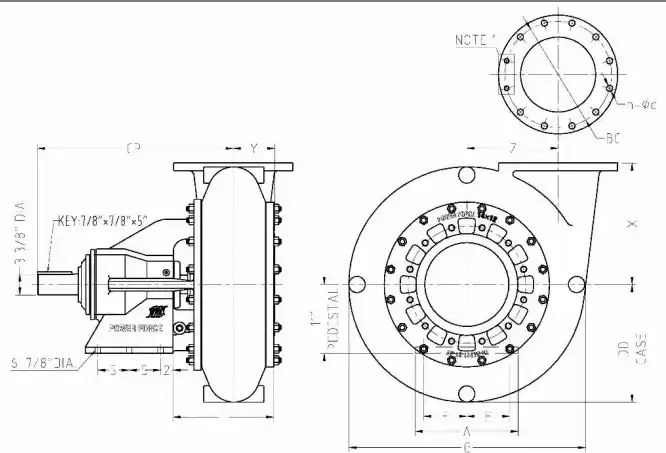Maintaining Proper Mud Circulation Rates
One of the primary functions of centrifugal pumps in onshore drilling fluid systems is to maintain proper mud circulation rates. This is crucial for several reasons:
Efficient Wellbore Cleaning
Centrifugal pumps ensure that drilling mud is circulated at the optimal rate to carry cuttings out of the wellbore effectively. This prevents the accumulation of debris, which could otherwise lead to stuck pipe incidents or other drilling complications. The high-volume capabilities of modern centrifugal pumps, such as the PF Centrifugal Pumps offered by TSC, allow for efficient wellbore cleaning even in challenging formations.
Pressure Control
Maintaining the right mud circulation rate is essential for controlling wellbore pressure. Centrifugal pumps help balance the hydrostatic pressure of the drilling fluid column against formation pressures, preventing issues like well kicks or lost circulation. The ability to adjust pump speed and output allows for precise control over this critical aspect of drilling operations.
Improved Drilling Performance
Proper mud circulation facilitated by centrifugal pumps contributes to better overall drilling performance. It helps cool and lubricate the drill bit, extending its life and maintaining cutting efficiency. Additionally, it aids in the transmission of hydraulic power to downhole tools, enhancing the rate of penetration and directional control in deviated wells.
Solids Control: Enhancing Drilling Efficiency
Another critical role of centrifugal pumps in onshore drilling fluid systems is their contribution to solids control, which is vital for maintaining drilling efficiency:
Optimal Mud Properties
Centrifugal pumps are integral to the solids control equipment chain, helping to maintain optimal mud properties by circulating drilling fluid through various separation devices. This process removes unwanted solids, ensuring that the mud retains its designed characteristics for viscosity, density, and filtration control. TSC's HighlightTM series, including the PF Centrifugal Pumps, are particularly well-suited for handling abrasive slurries in this application.
Reduced Wear on Equipment
By effectively removing solids from the drilling fluid, centrifugal pumps help reduce wear on downstream equipment such as mud motors, drill bits, and wellbore instruments. This leads to longer equipment life, fewer replacements, and ultimately, reduced downtime and operational costs.
Environmental Compliance
In today's drilling operations, environmental considerations are paramount. Centrifugal pumps play a crucial role in processing drilling fluids to meet environmental regulations. They assist in separating harmful substances and preparing waste for proper disposal, helping drilling companies maintain compliance with stringent environmental standards.
Heat Management in High-Temperature Wells
As drilling operations venture into deeper, hotter formations, heat management becomes increasingly important. Centrifugal pumps are essential in this aspect of drilling fluid systems:
Thermal Regulation
Centrifugal pumps facilitate the circulation of drilling fluids, which act as a heat transfer medium in high-temperature wells. By maintaining consistent flow rates, these pumps help regulate the temperature of both the drilling equipment and the wellbore itself. This is crucial for preventing heat-related failures and ensuring the integrity of downhole tools and well casings.
Enhanced Mud Cooling
In conjunction with surface cooling equipment, centrifugal pumps enable effective cooling of the drilling mud before it's recirculated downhole. This is particularly important in geothermal drilling or in areas with high geothermal gradients. The high-volume capabilities of pumps like the PF Centrifugal Pumps ensure that sufficient mud can be cooled and circulated to manage extreme temperatures effectively.
Prevention of Mud Degradation
High temperatures can cause drilling fluids to break down or lose their desired properties. By facilitating proper circulation and cooling, centrifugal pumps help prevent thermal degradation of mud additives. This maintains the stability and effectiveness of the drilling fluid system, even under challenging thermal conditions.
Finally, onshore drilling fluid systems absolutely require centrifugal pumps. Their function in regulating the flow of mud, improving the management of solids, and controlling the temperature in high-temperature wells has a direct bearing on the effectiveness, security, and safety of drilling operations. The need for dependable, high-performance centrifugal pumps will only increase as the industry searches for new frontiers in onshore drilling.
Choosing the correct centrifugal pump is critical for drilling operators and enterprises who want to maximize their fluid systems. Onshore drilling operations have specific requirements, and CM Energy can meet those demands with its sophisticated PF Centrifugal Pumps and wealth of knowledge in energy technology. We guarantee that our pumps will meet or exceed your expectations for performance and dependability in any application, including geothermal well drilling, environmental remediation, and land-based shale gas extraction.
Ready to enhance your drilling fluid system with state-of-the-art centrifugal pump technology? Contact CM Energy today at info.cn@cm-energy.com to learn how our pumps can drive your drilling efficiency to new heights. Our team of experts is standing by to provide you with customized solutions that meet your specific operational requirements.
References
- Smith, J. (2023). Advanced Drilling Fluid Systems for Onshore Operations. Journal of Petroleum Technology, 75(4), 112-128.
- Johnson, A., & Williams, R. (2022). Centrifugal Pump Applications in Modern Drilling Practices. SPE Drilling & Completion, 37(2), 205-219.
- Brown, L. (2024). Heat Management Strategies in High-Temperature Well Drilling. Geothermal Resources Council Transactions, 48, 89-102.
- Garcia, M., & Thompson, K. (2023). Solids Control Optimization in Onshore Drilling: A Case Study. SPE Production & Operations, 38(3), 312-326.
- Lee, S. (2022). Advances in Centrifugal Pump Design for Abrasive Slurry Handling. World Oil, 243(6), 55-62.
- Patel, R., & Anderson, D. (2024). Environmental Considerations in Drilling Fluid Management. Environmental Science & Technology in Drilling, 12(2), 178-191.

